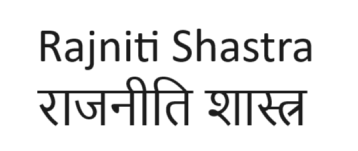Rajniti Shastra is a Sanskrit term that translates to “science of politics”.
It is the traditional Indian study of statecraft, governance, and political theory. It has a long history dating back to ancient India, with roots in texts like the Arthashastra, the Manusmriti, and the Mahabharata.
Here are some details about Rajniti Shastra:
- Focus: Rajniti Shastra focuses on a wide range of topics related to governance, including the duties and qualities of a leader, the importance of law and justice, the role of the military, and the art of diplomacy.
- Theoretical Framework: It developed a theoretical framework for understanding the nature of power, the role of the state, and the relationship between rulers and ruled.
- Emphasis on Ethics: It emphasizes the importance of ethical conduct for rulers and the need for them to act in the best interests of their people.
Rajniti Shastra continues to be an important source of inspiration for political thought in India today.
Rajniti Shastra’s theoretical framework offers a multi-faceted approach to governing and understanding the dynamics of power. Here are some key aspects:
- Saptanga Theory: This theory proposes seven essential elements for a successful state. These elements are:
- Swami (King): The ruler, their qualities and duties.
- Amatya (Ministers and advisors)
- Janapada (Territory)
- Durga (Fortified cities and treasury)
- Sena (Military)
- Mitra (Allies)
- Vigraha (Enemies)
By maintaining a balance and strength in each element, the state can achieve stability and prosperity.
- Dharma, Arthashastra, and Kama: These three concepts form the foundation for achieving a just and successful state.
- Dharma: Refers to ethical and moral duty. A ruler must act righteously and in accordance with the law.
- Arthashastra: Focuses on material well-being and economic prosperity. The state should ensure its financial stability and resource management.
- Kama: Represents desire and enjoyment. A ruler should find a balance between fulfilling their duties and personal desires.
- Nature of Power: Rajniti Shastra acknowledges the importance of power, but emphasizes its responsible use. A ruler’s power should be wielded for the good of the people, not personal gain.
- Rulers and the Ruled: The ideal relationship between rulers and the ruled is one of mutual respect and obligation. The ruler should protect and provide for the people, while the people should obey just laws and support the state.
These are some of the core principles that contribute to Rajniti Shastra’s theoretical framework. It’s important to remember that this is a vast field of study, and there are different interpretations and perspectives within it.
Rajniti Shastra places significant emphasis on ethical conduct for those in power. Here are some key ideas:
- Dharma: As mentioned previously, Dharma is a central concept and translates to “righteous duty” or “moral law”. It forms the basis for ethical conduct and requires rulers to act with integrity, justice, and fairness.
- Qualities of a Just Ruler: A good ruler should possess qualities like:
- Satya (Truthfulness): Honesty and transparency in their actions and words.
- Nyaya (Justice): Upholding impartial justice and ensuring due process.
- Dana (Generosity): Using resources for the public good and helping those in need.
- Asteya (Non-stealing): Not abusing power for personal gain or corruption.
- Maintaining Social Order: Ethical conduct is seen as essential for maintaining social order and harmony. A ruler who acts unethically creates mistrust and instability.
- Importance of Advisors: Surrounding oneself with wise and ethical advisors is crucial. These advisors can guide the ruler and ensure their decisions align with Dharma.
- Consequences of Unethical Conduct: Rajniti Shastra warns of the repercussions of unethical behavior. A ruler who acts unjustly risks losing the support of the people and divine favor, leading to downfall.
It’s important to note that Rajniti Shastra is an ancient text, and some of its ethical principles might be interpreted differently in a modern context. However, the core idea of ethical leadership remains relevant, emphasizing the importance of just and responsible rule.

